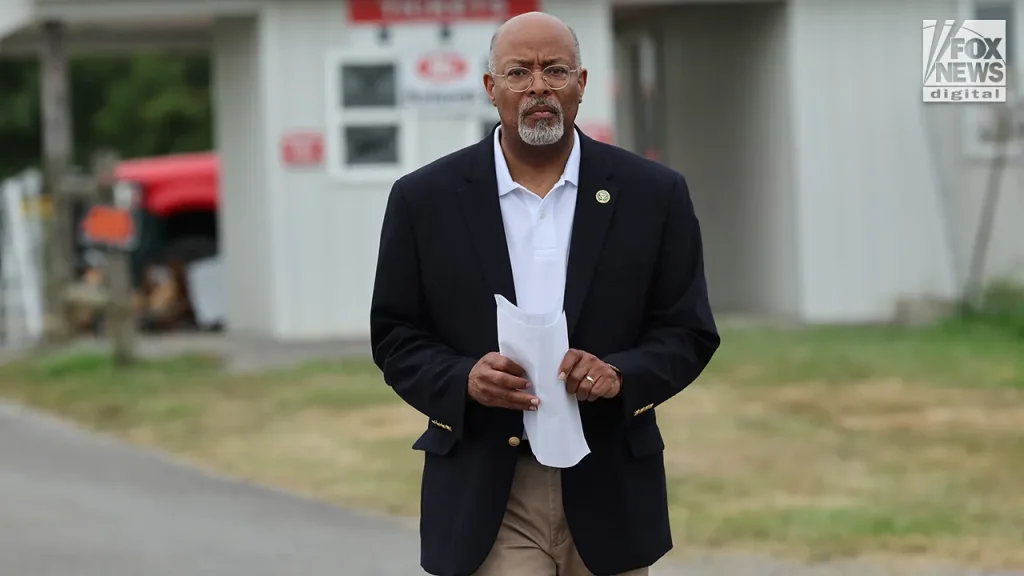Democrats’ Last-Ditch Effort to Extend Obamacare Subsidies Amid Government Shutdown
In a nearly empty House chamber on Monday, Rep. Glenn Ivey (D-Md.) attempted a bold maneuver to extend COVID-era Obamacare subsidies that are set to expire at year’s end. Standing before a chamber mostly vacant during a pro forma session, Ivey requested unanimous consent to extend the Affordable Care Act tax credits. His request was promptly overruled as Rep. Adrian Smith (R-Neb.), who was presiding over the session, simply gaveled over Ivey’s motion without acknowledging it. This unorthodox attempt highlights the growing desperation among Democrats to salvage key healthcare supports as the government shutdown crisis moves toward resolution.
The attempted parliamentary maneuver comes at a critical juncture in the shutdown saga that has paralyzed federal operations for 40 days. Just one day earlier, the dynamics of the standoff shifted dramatically when eight Senate Democrats broke ranks to vote with Republicans on advancing a short-term spending bill that would reopen the government through January 30. This bipartisan vote effectively undermined Democratic leadership’s strategy of holding firm on demands to include the Obamacare subsidy extensions in any government funding agreement. Senate Minority Leader Chuck Schumer and House Minority Leader Hakeem Jeffries had previously insisted these subsidies were non-negotiable, arguing that their sudden expiration would leave millions of Americans facing sharply higher healthcare premiums overnight.
The subsidies in question were implemented in 2021 as part of emergency pandemic relief measures, expanding financial assistance to make health insurance more affordable for middle-income Americans. As these enhanced subsidies approach their December 31 expiration date, Democrats have increasingly sounded alarms about the potential consequences. Without an extension, many families could see their premiums increase by hundreds or even thousands of dollars annually beginning in January. The timing is particularly problematic as it coincides with the open enrollment period when Americans are selecting their healthcare plans for the coming year, creating uncertainty about what coverage will actually cost.
Many House Democrats have characterized the Senate’s advancement of the shutdown-ending measure without the subsidy extensions as a capitulation to Republican demands. The frustration is palpable among progressive members who believe Democratic leadership should have maintained a harder line on healthcare affordability. Critics of the subsidies from the Republican side argue that these emergency measures have outlived their purpose now that the pandemic emergency has ended. Some conservative voices have further suggested that continuing these enhanced subsidies actually contributes to healthcare inflation by artificially propping up premium costs without addressing underlying affordability issues in the healthcare system.
The debate over these subsidies reveals deeper ideological divisions about the government’s role in healthcare affordability. Democrats largely view the enhanced subsidies as essential protections that make health coverage accessible to middle-class Americans who might otherwise be priced out of the market. Republicans, meanwhile, have been divided on the issue—with some supporting a gradual phaseout rather than an abrupt end, while others advocate for entirely different approaches to healthcare reform. This specific dispute has become emblematic of the broader challenges in finding consensus on major policy questions during periods of divided government, especially when wrapped up in the high-stakes context of a government shutdown.
With the Senate poised to pass the short-term funding bill within days, Speaker Mike Johnson has indicated the House will quickly take up the measure once it clears the Senate. This suggests the 40-day government shutdown—the longest in recent history—may soon end, though without resolving the Obamacare subsidy question that Democrats had prioritized. The temporary funding through January 30 essentially kicks these contentious policy decisions down the road, setting up another potential showdown early in the new year. For millions of Americans who rely on these subsidies to afford health insurance, the coming weeks will bring continued uncertainty about whether Congress will act before the financial impact hits their household budgets in January.


